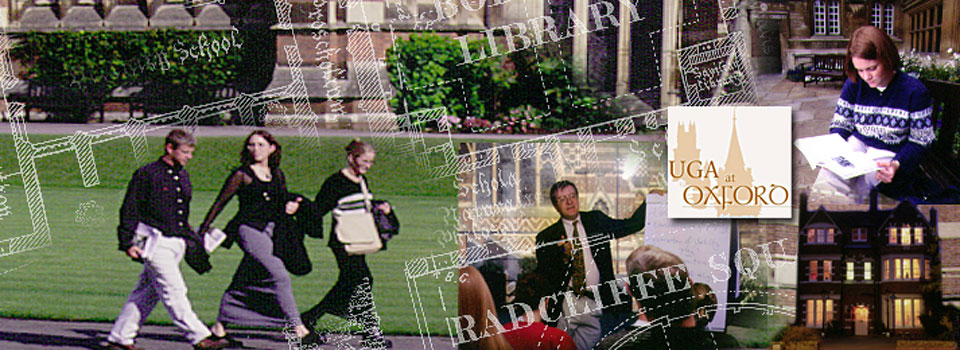Still tanned from the hot Georgia sun, a group of UGA students in dripping rain slickers walk across an avenue in Oxford’s city center. On a dismal day shortly after their arrival, the students open and close their umbrellas to shake off the last of the rain, wipe their feet on a woven straw doormat, then duck into a pub, framed in dark oak paneling.
For these study-abroad students, tailgate parties were traded for double-decker buses and tank tops for overcoats when UGA linked them with Oxford. Similarly spaced from London as Athens from Atlanta, Oxford’s possible advantage over study-abroad programs in Cortona or Costa Rica: the English speak a common language.
Oxford is a good lesson for kids from Atlanta, Macon, and Albany who jaunt across the pond believing, as so many Americans do, that the rest of the world is an also-ran, playing second fiddle to American fashion, technology, and finance. What kids from Valdosta and Augusta discover as an adjunct to Oxford’s “scheduled” curriculum is the invaluable lesson that despite an English love for things American-Harleys, Marlboros, and Levi’s-there is something undeniably European about Europeans. Although Americans speak something similar to the British form of the language, the mother tongue moves with a different speed.
For every Bulls jersey-clad English lad with Metallica lyrics rolling from his tongue, there’s a 75-year-old man plodding assuredly, like generations past, from market on a one-speed bicycle with a brown wicker basket brimming with fresh fruits and vegetables-greens and reds and yellows against purple flowers.
For associate provost for international affairs Judy Shaw, these types of eye-opening experiences are the reasons she has dedicated more than a decade of her life to the project.
“Education is the first priority and we will always make that the number-one focus of the program, but another obvious benefit is that students become finer members of a global community,” says Shaw from the glass conservatory in the rear of the UGA house. “They learn about themselves, while becoming more attractive to an increasingly global market. Alumni and businesses are very aware of graduates with international savvy.”
With the purchase of the Victorian house-complete with lush, green backyard and patio, splendid English gardens, and a bulging apple tree-for an Oxford market bargain of one million pounds ($1.6 million), UGA is now one of only four American universities (the others are Boston University, Stanford and Williams) and the only public institution with a full-time residence in Oxford and associate memberships to the historic university. On all fronts, UGA students have been afforded expanded latitudes for discovery.
The UGA at Oxford students, who were previously chosen on a first-come basis, are now chosen through a competitive GPA standard. The 13 charter members from the first summer-only Oxford session back in 1989 have now mushroomed to 125 per year with different groups attending the fall, spring, and summer sessions.
